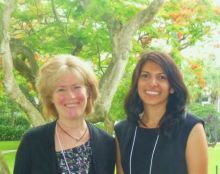
 Community Psychology Practice Competencies: A Global Perspective
Community Psychology Practice Competencies: A Global Perspective
Susan M. Wolfe, Victoria Chien Scott, & Tiffeny R. Jimenez
Guest Editors
Community Psychology is a unique field of community science incorporating research and action that seeks to promote social change by challenging the status quo and promoting social justice. Accordingly, within this special issue, we challenge our current educational practices in the belief that we could have greater impact if we were more intentional and consistent in the development of professionals of the field who work in more applied positions. It is within these action-focused positions that we expect to most affect change within communities. Our educational opportunities in community-based research methods have been consistent across training programs; however, those competencies alone are not enough to create the change we wish to see.
Leer más... Are Our Competencies Revealing Our Weaknesses? A Critique of Community Psychology Practice Competencies
Are Our Competencies Revealing Our Weaknesses? A Critique of Community Psychology Practice Competencies Peta Dzidic, Lauren J. Breen, & Brian J. Bishop
Peer Reviewed
In this paper we argue that the focus on the development and application of practice competencies for community psychology runs the risk of being a distraction from good practice. We outline three areas that demonstrate the inherent flaws in focusing on traditional notions of competencies for community psychology – the limitations of competencies themselves, the schism between competencies and ethics, and the disconnect between competencies and applied practice.
Leer más... Community Psychology Practice Competencies in Undergraduate and Graduate Programs in Italy
Community Psychology Practice Competencies in Undergraduate and Graduate Programs in ItalyDonata Francescato & Bruna Zani
Peer Reviewed
In this paper we discuss several Community Psychology (CP) practice competencies learned in our existing undergraduate and graduate programs, which are similar to the ones taught in most international settings. We then describe some specific intervention methodologies that have been developed in Italy and in Europe. In the third part of the paper, we attempt to look at some of the challenges facing CP training programs in this time of crisis and uncertain future.
Leer más... Community Psychology Practice Competencies in Egypt: Challenges and Opportunities
Community Psychology Practice Competencies in Egypt: Challenges and OpportunitiesAmy Carrillo & Carie Forden
Peer Reviewed
The Society for Community Research and Action’s proposed competencies for community psychology practice are examined within the Egyptian context, specifically from the perspective of a Master’s program at The American University in Cairo. While this program integrates most of the competencies into the curriculum, thesis, and internship opportunities, the emphasis on various competencies may differ from programs in the United States because the program is situated within a different cultural and political climate.
Leer más... Building Community Practice Competencies Globally through the Community Tool Box
Building Community Practice Competencies Globally through the Community Tool BoxChristina Holt, Stephen B. Fawcett, Jerry A. Schultz, Bill Berkowitz, Thomas J. Wolff, & Vincent T. Francisco
Peer Reviewed
People throughout the world are working together to improve conditions in which they live. Although the issues and resources vary by context, what people actually do to effect change—core competencies of assessment, planning, action, evaluation, and sustainability—may be quite similar. To examine what competencies may be most valued in community practice, this report uses data analytics for what users are accessing in the Community Tool Box http://ctb.ku.edu/.
Leer más... Community Psychology and the Future of Healthcare
Community Psychology and the Future of HealthcareChris Michael Kirk and William D. Neigher
Peer Reviewed
Healthcare reforms and market pressures are rapidly moving U.S. healthcare systems from volume to value, from traditional medicine to population health. In this environment, a new set of skills will be required for organizational success. We believe that community psychologists are uniquely positioned to contribute to these efforts. The purpose of this paper is to explore the relevant practice competencies in the evolving context of health care in the United States.
Leer más... A Learning Journey I: Curriculum Mapping as a Tool to Assess and Integrate Community Psychology Practice Competencies in Graduate Education Programs
A Learning Journey I: Curriculum Mapping as a Tool to Assess and Integrate Community Psychology Practice Competencies in Graduate Education ProgramsGregor V. Sarkisian and Sylvie Taylor
Peer Reviewed
Curriculum mapping is introduced as a practical tool for community psychology graduate and professional education programs to assess how their curriculum addresses community psychology practice competencies and to further develop their program. Using the Applied Community Psychology Specialization as an illustrative case study, a six-step process for mapping curriculum to community psychology practice competencies is described. Implications for academic program development and limitations to the curriculum mapping process are discussed.
Leer más... A Learning Journey II: Learned Course Maps as a Basis to Explore How Students Learned Community Psychology Practice Competencies in a Community Coalition Building Course
A Learning Journey II: Learned Course Maps as a Basis to Explore How Students Learned Community Psychology Practice Competencies in a Community Coalition Building CourseGregor V. Sarkisian, M. Ameerah Saleem, Jeremy Simpkin, Ann Weidenbacher, Natalie Bartko, & Sylvie Taylor
Peer Reviewed
This paper presents an illustrative case study of how students learned community psychology practice competencies. Utilizing course mapping, focus groups, and reflective writing, students and faculty coded, analyzed and interpreted student data to better understand learning activities and processes which contributed to learning community psychology practice competencies in a coalition building course.
Leer más...
This video is from the SCRA Video Contest. It features an initiative that incorporates the arts, and follows community psychology values and principles, to facilitate solutions for homelessness from arts-informed research.
ver el vídeo
This video of an interview of Dr Iscoe is a great companion for this special issue on core competencies. Dr Iscoe offers valuable insights relevant to the articles and the topic.
ver el vídeo
This video of Marie Jahoda has relevance for understanding competencies in community psychology practice more broadly.
ver el vídeo
This video of an interview of Dr Wellin is a great companion for this special issue on core competencies. Dr Wellin offers valuable insights relevant to the articles and the topic.
ver el vídeoDear SCRA-L Members:
APA does not allow, without their prior approval, political calls to action on APA listservs. This includes SCRA-L and most of the other lists on the SCRA website. Political calls to action invite individuals to contact their legislators or other government officials about pending or proposed legislation at national, state or local levels.
Given APA's policy, the EC has asked the SCRA Public Policy Committee, which we currently co-chair, for recommendations on how best to proceed. One option we are considering is to create a new, non-APA/non-SCRA listserv for anyone willing to receive political calls to action. It is not anticipated that this would be a high-frequency list.
Would you subscribe to such a list? If we receive enough affirmative responses, we will explore this possibility.
Please reply to <d.perkins@vanderbilt.edu> if you would subscribe to a new, non-APA-run Community Psychology listserv for political calls to action.
Thanks.
Doug Perkins and Ken Maton
Tom Wolff & Gregor Sarkisian
Community psychology (CP) practice competencies have recently emerged as a contemporary issue in community psychology (Society for Community Research and Action, 2012). One of the more challenging CP practice competencies to learn, in the experience of the authors of this paper, is collaboration and coalition development, listed under Community and Social Change as CP practice competency number twelve – “The ability to help groups with common interests and goals to do together what they cannot do apart” (SCRA, 2012, p. 12). This paper describes a community coalition simulation exercise as a teaching tool for CP practice competencies in both community and academic settings. Whether one is engaging in working as a member of a coalition for the first time, or, engaging in learning collaboration and coalition building as a student of CP, teaching and learning about coalition development is challenging.
by E. Whitmore, M. G. Wilson, & A. Calhoun (Editors)
This book is a compilation of the experiences of 86 activists from nine groups and organizations across Canada that are described by the activists themselves. The project had two primary purposes: (1) to support the valuable work of activities by allowing them to reflect on their efforts and the impact they are making; and (2) to explore questions about successful activism. The first chapter of this book provides a definition of activism, and describes the three phases of the book: (1) the context surrounding activism and how it informed their project; (2) contributions from the organizations they worked with using their own formats and stories; and (3) a summary by the editors of the range of meanings of effectiveness in activism and reflections of what they learned from this experience.
This new special issue of the Global Journal contains several very important articles on core competencies in community psychology practice. In this special issue of the GJCPP, you will find 7 peer-reviewed articles, a featured Tools of the Trade, a featured Book Review, and 4 featured Videos -- all with relevance to the development of core competencies in community psychology practice. The Guest Editors for this issue include Susan Wolfe, Victoria Chien Scott, and Tiffeny Jimenez.